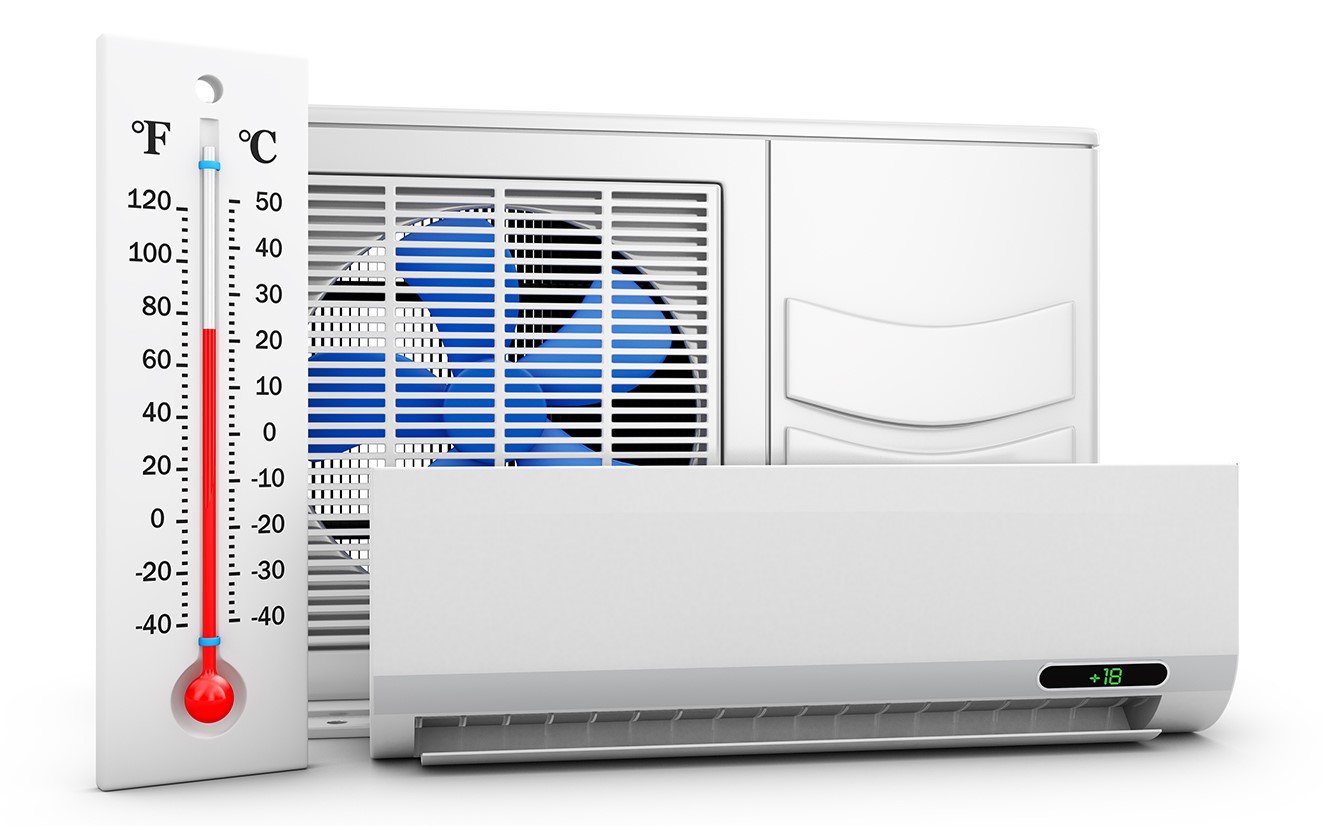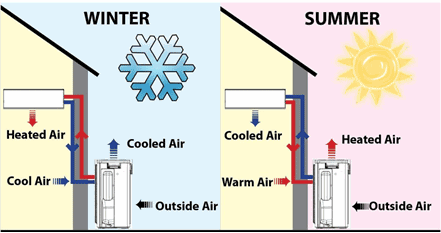
Have you ever sat in the warm comfort of your home and wondered ‘exactly how does my heat pump work’? Well, we’re glad you asked.
In heating mode, heat pumps are like a reverse refrigerator. That’s because they don’t create heat – they simply transfer it from one place to another.
In winter, your system absorbs heat from the cool air outside and transfers it inside your home using refrigerant as the heat transfer medium. It is essentially moving heat energy from its surroundings. It may seem counter-intuitive to use cold air as a heat source, but heat energy is present even at very cold temperatures.
In summer, when your heat pump is set to cooling mode, the process is reversed and it will act as an air conditioner. It extracts heat energy from the air within your home and transfers it outside using the same heat transfer medium.
Heat pumps are an energy- and cost-efficient way to air condition, cool, and heat your home.
Heat Pumps are amazing pieces of technology. In the middle of winter when most of us are complaining about the cold, heat pumps are looking outside for heat. That’s because even when it's below freezing outside, heat energy is still present and your heat pump will hunt it out, transfer it into heat and deliver it into your home.
Heat Pumps are also eco-warriors. Your heat pump is a great lover of the environment and knows how to reduce, reuse, and recycle. Instead of generating new heat, the system will move heat that was already there to warm your home.
This reduces how much energy you use to heat or cool your home by as much as 40%. Reduced energy usage means reduced power bills. And we all like the sound of that!
Heat Pumps hate to sweat too. In the summer when your heat pump is working in cooling mode, it will remove excess moisture and reduce indoor humidity levels. In heating mode it removes moisture from your room as warm air is circulated around it.
There are three main types of residential heat pumps: high-wall single split, Multi Split Systems and Ducted Systems.
High Wall Single-split systems
A single-split high wall heat pump is the most common system in New Zealand and consists of two components – an outdoor unit and an indoor unit. In heating mode, the indoor unit functions as a condenser, whereas in cooling mode, it works as an evaporator. Conversely, the outdoor unit operates in reverse, acting as an evaporator in heating mode and a condenser in cooling mode.
A Heat Pump in heating mode operates just like it does in cooling mode, except that the flow of refrigerant is reversed by the aptly named reversing valve. This flow reversal enables the outside air to act as the heating source (even when outdoor temperatures are low) and the heat energy is released inside the home.
Multi-split systems
Multi-split systems connect one outdoor unit to multiple indoor units to heat different rooms in your home. These systems are great options for people who have larger homes or want to have several indoor units, but don't have the space for multiple units outside. With multi-split systems you have a choice of indoor units such as high-wall, ceiling console or ceiling cassette.
Ducted Heat Pumps
A Ducted Heat Pump System is a type of heat pump unit that works by providing conditioned air to the entire home or specified zones through vents or ducts. These are generally fitted into your home’s ceiling space and circulate heated or cooled air throughout your entire home. Offering incredible flexibility in duct and vent placement, this system offers a discreet and aesthetic answer to whole home comfort.
The ducted system’s ability to maintain healthy airflow has some added benefits for you and your family. By removing damp air and encouraging circulation throughout your home the ducted air conditioning system helps to keep the build-up of condensation to a minimum, reducing mould and other issues that are a result of excessive dampness in the home environment.
On average, a well-maintained heat pump system should last approximately 10 to 12 years. However, with proper care and maintenance, they can last even longer.
The lifespan of heat pump varies depending on several factors, including the type of unit, the quality of installation and maintenance, and the operating conditions.
Regular maintenance, such as cleaning or replacing air filters and having your heat pump regularly serviced by a qualified HVAC technician can help extend the lifespan of your system.
There are few downsides to heat pumps as a way to keep your home warm in winter and cool in summer.
It's important to choose energy-efficient models that suit your space to avoid driving your power bills up. See Rinnai's heat pump calculator to find the right options for you.
Another consideration is the ongoing maintenance costs – these should only average approximately $100 per year if you regularly clean your filters.
A heat pump’s performance can be compromised when the ambient outdoor temperature falls below 2°C. They will still work but may struggle to provide the required heating capacity in these colder conditions.
Efficiency and heating capacity of a heat pump system are not constant – they vary along with the temperature differential between indoor and outdoor air. A heat pump’s rated efficiency and heating capacity are for particular outdoor temperatures and heating/cooling loads.
As the difference between outdoor temperature and desired indoor temperature increases, the efficiency of a heat pump system decreases.
For this reason, standardised testing must be undertaken at specific levels of temperature and humidity - this is referred to as the H2 rating.
The introduction of the H2 rating scheme by EECA is aimed at helping customers make better-informed decisions regarding their heat pump unit's performance, specifically in mid to Southern New Zealand locations. The H2 rating system measures heat pump heating performance outputs at 2°C outdoor ambient conditions, which is a more realistic average temperature condition for these regions.
One of the most important things to understand about heat pump operation and the process of transferring heat is that heat energy naturally wants to move to areas with lower temperatures and less pressure. Heat pumps rely on this physical property, putting heat in contact with cooler and lower pressure environments so that the heat can transfer naturally.

So there you have it. A heat pump is a truly amazing invention that is an integral and much-valued addition to any Kiwi home – no matter the season.
And remember – when the weather turns, turn to someone you can trust. Rinnai – your specialists in home comfort.